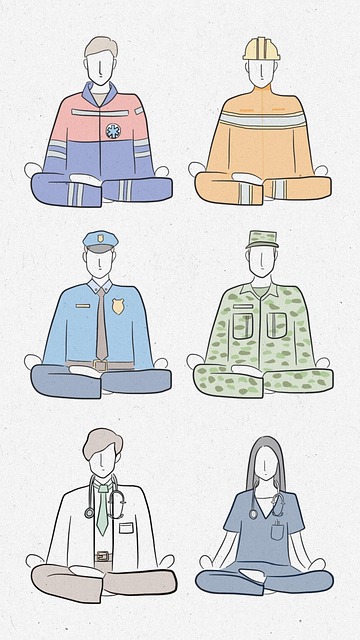Burnout among healthcare providers caring for children with chronic illnesses is a significant concern due to high-stress situations and complex care needs. Recognizing symptoms like irritability, cynicism, and reduced job satisfaction is vital. Proactive measures including trauma support, mental wellness programs, stress management workshops, compassion cultivation practices, and self-care routines prevent burnout. Tailored mental health education empowers professionals to manage their well-being while improving patient outcomes through compassionate care. Therapy, including mindfulness and empathy-focused interventions, builds resilience against the demanding nature of pediatric chronic illness management, ensuring long-term career sustainability for essential healthcare providers.
“Healthcare provider burnout is a growing concern, particularly within pediatric settings. This article explores comprehensive strategies to combat this issue, focusing on various aspects of prevention. We delve into understanding burnout among healthcare providers, with a specific emphasis on pediatricians and children’s hospitals. By integrating effective coping mechanisms, self-care practices, and the therapeutic benefits of addressing chronic illnesses in youth, we aim to provide insights that foster resilience and mitigate burnout.”
- Understanding Burnout Among Healthcare Providers
- Targeted Strategies for Pediatricians and Children's Hospitals
- Integrating Effective Coping Mechanisms and Self-Care Practices
- The Role of Therapy in Preventing Burnout for Those Caring for Chronic Illnesses
Understanding Burnout Among Healthcare Providers

Burnout among healthcare providers is a growing concern, particularly within pediatric settings where professionals frequently encounter high-stress situations involving children with chronic illnesses and complex medical needs. This phenomenon goes beyond mere fatigue; it encompasses emotional exhaustion, depersonalization, and a diminished sense of personal accomplishment. Healthcare providers, often driven by compassion and a desire to help, may struggle to set boundaries between work and personal life, leading to prolonged exposure to stressful situations that can manifest as burnout over time.
Recognizing the signs of burnout is crucial for both individuals and organizations. Symptoms can include increased irritability, cynicism towards patients or colleagues, reduced patient care quality, and decreased job satisfaction. Proactive measures such as trauma support services, mental wellness programs, and stress management workshops within healthcare institutions can play a pivotal role in preventing burnout. These initiatives foster a culture of resilience, encouraging open conversations about mental health challenges and providing tools for effective coping strategies.
Targeted Strategies for Pediatricians and Children's Hospitals

Pediatricians and children’s hospitals face unique challenges when it comes to burnout prevention. The demanding nature of pediatric care, often involving complex chronic illness management and extensive family involvement, requires specialized strategies. One effective approach is incorporating compassion cultivation practices into the healthcare setting. These practices encourage providers to develop a deeper sense of empathy and self-awareness, fostering a supportive environment for both patients and caregivers. By nurturing compassion, pediatricians can better manage the emotional demands of their work.
Additionally, implementing self-care routine development for better mental health is vital. This includes encouraging regular breaks, setting boundaries, and prioritizing personal well-being. Self-care practices such as mindfulness meditation, exercise, and adequate sleep can significantly reduce stress levels and enhance resilience. Such initiatives not only benefit pediatricians but also improve patient outcomes by ensuring healthcare providers are at their best, ready to offer compassionate and effective therapy for children with chronic illnesses.
Integrating Effective Coping Mechanisms and Self-Care Practices

Healthcare providers, especially those managing therapy for children with chronic illnesses, need integrated coping mechanisms and self-care practices to prevent burnout. These strategies encompass a holistic approach that goes beyond basic stress reduction methods. Mental health education programs designed specifically for healthcare professionals can equip them with the knowledge and skills to manage their own mental well-being effectively.
By incorporating activities that foster resilience, such as mindfulness exercises or creative outlets, providers can reduce the emotional toll of their work. Regular self-care practices, including adequate sleep, physical exercise, and social connections, are essential components in burnout prevention. These strategies not only enhance the provider’s ability to care for others but also create a sustainable career path, ensuring long-term mental health and well-being.
The Role of Therapy in Preventing Burnout for Those Caring for Chronic Illnesses

For healthcare providers managing chronic illnesses in both pediatric and adult populations, therapy plays a pivotal role in preventing burnout. Compassion cultivation practices, such as mindfulness and empathy-focused interventions, can help caregivers develop emotional resilience against the demanding nature of their work. These therapeutic approaches enable them to better manage stress, foster positive connections with patients, and navigate the challenges inherent in chronic illness care.
Integrating therapy into burnout prevention strategies involves risk assessments for mental health professionals to identify early warning signs among providers caring for children with chronic conditions. Through targeted interventions, therapists can support healthcare workers in building resilience, promoting self-care, and cultivating a sense of purpose. By addressing the unique psychological demands of this caregiving role, therapy enhances overall well-being and prevents burnout, ensuring that these essential professionals can continue to deliver high-quality care over the long term.
Healthcare provider burnout is a growing concern, but with targeted strategies, it can be effectively mitigated. By understanding the unique challenges faced by pediatricians and children’s hospitals, integrating coping mechanisms, and prioritizing self-care, we can foster resilient practices. Additionally, therapy plays a crucial role in preventing burnout among those caring for children with chronic illnesses, offering much-needed support and tools to navigate this demanding landscape. Implementing these strategies ensures a healthier, more sustainable workforce dedicated to providing optimal care for young patients.














